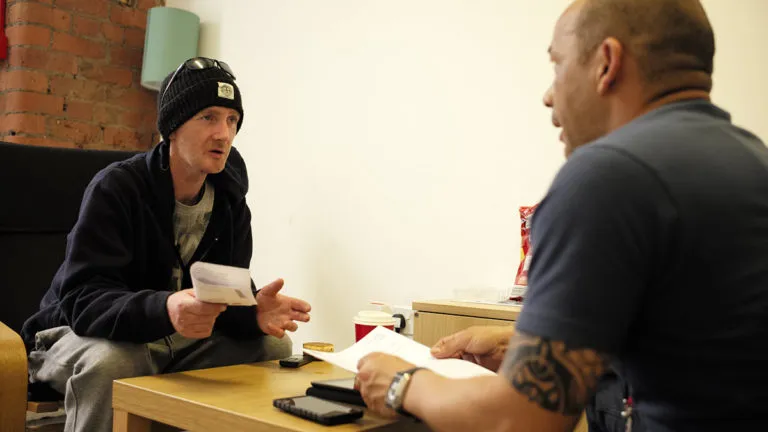The government’s response to Universal Credit court fine deductions
Published: by Steph Kleynhans

Many of the people we see on a daily basis have come on an unthinkably difficult journey just to finally secure a settled home. It’s something many of us take for granted. After years of living on the streets, managing to maintain a home, bills and the administrative burden that comes with it is a triumph within itself. But for an increasing number of service users, this hard work and perseverance is being eroded because of huge deductions being taken from their Universal Credit (UC) payments to repay court fines. Those with experience of rough sleeping are more likely to be affected due to the criminalisation of rough sleeping and other related activities, like begging or travelling on public transport without a ticket.
We highlighted this back in December, and it’s something we continue to push. So it was encouraging to see the Work and Pensions Select Committee Chair, Stephen Timms MP, raise this in the House of Commons as a written question. But the response from the Minister for Welfare Delivery, Will Quince MP, left a lot to be desired.
Plunging people into poverty
Mr Quince cites the legislation in his answer, stating ‘deductions for court fines are based on rates provided in legislation’. This is true, but misleading. Within the relevant legislation, the Department for Work and Pensions (DWP) has discretion to take a minimum amount of 5% for court fine deductions. Jobcentre staff should have the flexibility to adjust the court fine deductions on a claimant’s UC income, based on the individual circumstances of the person – and taking into account financial hardship. But instead, the DWP guidance issued to Jobcentre staff and decision makers advises them to apply the maximum 30% rate for deductions for court fines regardless of the circumstances, removing the discretion provided for in the law.
Deducting the maximum amount for court fine repayments leaves people struggling to survive. With the maximum rate of 30% being automatically deducted, we see people left without enough money to survive on. Some are left with as little as £41 per week for food, bills, and travel. Having enough money for travel is particularly important, as UC claimants are often required to attend their Jobcentre on a regular basis for appointments with their Work Coach. If they fail to do so, they risk being sanctioned and being left with no income at all. Our services also see people struggling with their gas and electric bills, and they have to issue food bank vouchers.
It’s not good enough
This issue affects anyone who has a court fine repayment deducted from their UC award. A number of the people we see affected by the increase in court fine deductions are currently being helped by Housing First, or similar projects, which help former rough sleepers find a stable home. The government recognises the critical role that projects like Housing First play in ending rough sleeping. But maximum-rate court fine deductions make it difficult for former rough sleepers to cover essential living costs. This can risk putting them back down a path towards rough sleeping again.
Mr Quince’s answer is not good enough. If the government is serious about achieving its ambitious goal of ending rough sleeping, it must reform social security to ensure it does not plunge claimants into poverty and an increased risk of homelessness. We urge the DWP to revise its guidance accordingly, to include discretion for decision makers to deduct court fines at the minimum of 5% into the guidance.
If you or someone you know is struggling with maximum deductions for fine repayments, you can request the amount is lowered on the Universal Credit journal and seek advice from an organisation who can help you write a letter to the DWP and/or making an application to the Magistrates’ Court to have the fine reduced or remitted.
Shelter would like to hear from advice agencies supporting people in similar circumstances who are being affected by these maximum deductions for court fines. Please contact sophie_earnshaw@shelter.org.uk.